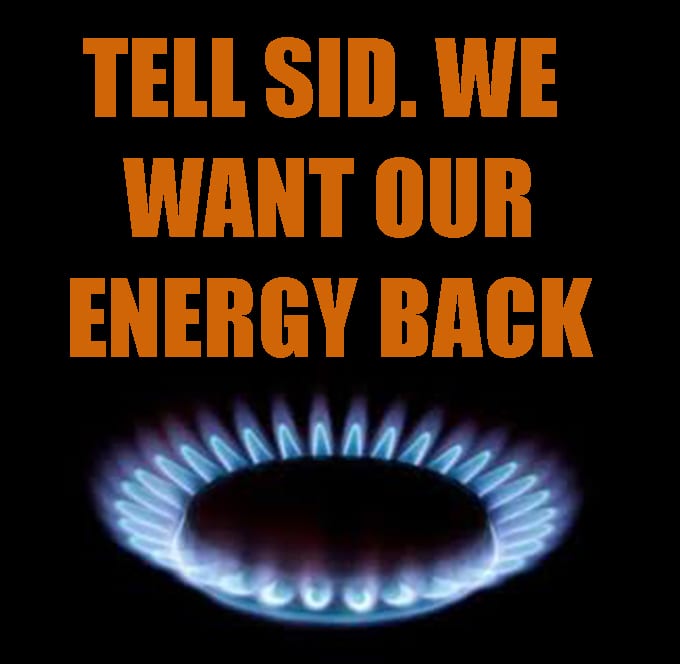An energy revolution is underway across the globe, and the old order is running scared. Big energy firms, once the greatest beneficiaries of liberalised electricity markets, are suddenly seeing their profit margins slump, their very futures imperilled. The traditional privatised utility model that has reigned supreme for twenty-five years is being rapidly undermined.
The effects are being felt most strongly in Germany and the US – but increasingly Britain’s Big Six energy firms are also under threat. In short, the Big Six are on the run.
What’s causing them to take fright is the disruptive power of renewable energy – particularly small-scale renewables owned by lots of people. The reasons for this are actually quite simple, but seldom explained.
The first reason is that the Big Six are facing a growing army of competitors. When the utilities were first privatised in the 1980s, they portrayed
themselves as the face of a new popular capitalism. The famous ‘Tell Sid’ adverts of the Thatcher years caught the mood as thousands of people bought up shares in the new energy companies.
But as the electricity market developed the number of shareholders and firms dwindled and ossified into the small oligopoly of suppliers that exist today. Dogged by numerous scandals, from doorstop mis-selling to accusations of price-fixing and competition inquiries, the Big Six today are hugely unpopular: purveyors of expensive electricity that’s dirty to boot.
Yet where regulators, governments and legislation has failed, a new David is rising up to challenge the big energy firms’ Goliath. Hundreds of thousands of households, businesses and investors have been investing in solar and wind power. Large numbers of non-traditional players have entered the electricity market and are challenging the dominance of the conventional utilities. A people’s army has risen up that’s taking ownership of the energy system.
It’s perhaps unsurprising that renewables should be the beneficiaries of this: besides being hugely popular – with large majorities consistently supporting solar and wind over any other energy technology – renewable energy is inherently decentralised.
Supplies of coal, oil, gas and uranium can be readily stored and controlled; but sunlight falls on every inch of the globe and there are few places where the wind never blows.
In some countries over the past decade, mass ownership of renewable energy has become a reality: in Germany, for instance, 50% of all
renewables are owned by households, farmers and cooperatives. Less than 10% are owned by big energy firms. The remainder are owned by other
private investors and businesses who have emerged as challengers to the traditional utilities.
The second reason why renewable energy is disrupting the big utilities is because it has certain inbuilt advantages over conventional forms of power generation. To generate power from the sun and wind, you need to invest upfront in solar panels and wind turbines – but once they’re installed, the power is basically free (or as economists say, ‘near-zero marginal cost’).
That poses a major conundrum for utilities whose main power generation assets are fossil fuel power stations with ongoing fuel costs – and increasingly high fuel costs at that.
It means that anyone selling renewable power into the grid has a competitive advantage. Since an extra unit of power output from a solar panel is essentially free, solar can outcompete coal, oil and gas. In nations with large amounts of solar, this is starting to cause wholesale electricity prices to crash, and eat into company profits. At the same time, distributed renewable energy systems place fewer demands o n expensive transmission grids, theoretically allowing them to supply power locally at low cost.
n expensive transmission grids, theoretically allowing them to supply power locally at low cost.
It is a classic instance of what the economist Josef Schumpeter called ‘creative destruction’, whereby technological innovation rips up the profits of the old order.
Of course, up until recently, renewables have remained a more expensive alternative because of the upfront costs of installing these technologies
– requiring public subsidies to get a look-in.
But this brings us to the third reason why traditional fossil-fuel utilities are under threat. Renewables, particularly solar but also onshore wind, have plummeted dramatically in cost over the past decade and in some parts of the world are now cheaper than fossil fuels, even without subsidy.
In fact, investment bank UBS predict that solar combined with batteries and electric vehicles will soon be cheaper than grid electricity and fuel in key markets like Germany, Spain and Italy. This is quite apart from the fact that fossil fuel generators aren’t paying the full costs of their pollution (or ‘externalities’).
All this has meant that large utilities in Germany, the US and elsewhere are seeing their market share reduced, and profits undercut. Many are being forced to adapt – or else lobby hard against the oncoming changes. “Utility companies that refuse to let go of an archaic system are losing investors’ money”, says US energy thinker Amory Lovins.
“Distributed energy is to utilities as social media is to newspapers”, argues the CEO of Bloomberg New Energy Finance, Michael Liebreich.
In the UK, energy firms appear to be at a crossroads. With two of the big German utilities, EON and RWE, also major players in Britain, how is the renewables revolution that’s sweeping the continent affecting what they lobby for in the UK?
Will the Big Six continue to pressure government behind the scenes to keep Britain from going the same way as Germany? And how can the British public reap the benefits of surging solar, plummeting prices and mass energy ownership?
Because if David beats Goliath – if the popular army of small-scale owners of renewables triumph over the clunking Big Six energy firms – then everything changes. Households, communities and businesses get to be producers of energy, not simply consumers.
They’ll no longer be at the mercy of annual price-hikes by a narrow set of suppliers but will get to benefit from fuel-free power and greater ownership of the energy system themselves. We’ll see Britain’s energy supply cleaned up, our emissions from electricity generation plummet, and the road cleared for mass roll-out of electric cars and heating.
This is a big, dramatic story that hasn’t yet been properly told. Indeed, it’s still unfolding. It’s the energy equivalent of when mobile phones leapfrogged landlines; when email replaced post; when canals got lapped by railways. In those earlier examples of technological transition, the
lumbering incumbents failed to spot the disruptive power of their smaller, smarter competitors, and got squashed. This is the story of how the power of the sun got the Big Six running scared.
This is an edited extract from the Friends of the Earth report: “The Big Six on the Run: How Renewables Are Disrupting Big Energy Firms Everywhere.” Reproduced here with permission







